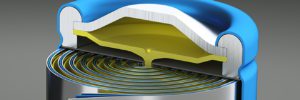
The electrification of global transport and buildout of renewable energy storage will require hundreds of millions of tons of nickel, cobalt, copper and manganese. As demand rises, so will concerns about shortages, and the environmental and social costs of producing these metals.
DeepGreen Metals is a deep-sea minerals exploration and development company with a mission to supply metals for the green transition with minimal environmental and social impact. The company has developed a process for producing metals from polymetallic nodules with near-zero solid waste, eliminating the need for tailings dams on land.
DeepGreen Metals recently acquired Tonga Offshore Mining Limited (TOML), giving the company exploration rights to a 75,000-square-kilometer block of seabed believed to contain some 756 million wet tons of polymetallic nodules.
The Clarion-Clipperton Zone (CCZ), a vast abyssal plain located between Hawaii and Mexico, contains the world’s largest known deposits of nickel, cobalt and manganese, contained in trillions of fist-size polymetallic nodules. Current exploration contracts in the CCZ account for 1.2 million square kilometers, and are estimated to contain enough metal to electrify the entire global car fleet. Confirmed resources in DeepGreen’s exploration areas alone contain enough metal to electrify over 250 million vehicles.
“The TOML project will enable us to bring more critical mineral resources to market to break through the bottleneck and shift away from fossil fuels,” said Gerard Barron, CEO and Chairman of DeepGreen. “Our research shows that ocean polymetallic nodules can provide society with these metals at a fraction of the environmental and social impacts associated with land-based extraction.”
Uncertainties remain around the impact of nodule collection on deep-sea ecosystems. To address these uncertainties, DeepGreen, in partnership with over 100 scientists from global marine science institutions, is undertaking an integrated surface-to-seabed research program encompassing over 75 studies, in order to fully understand the impacts of collecting nodules from the ocean floor.
“Collecting these nodules from the ocean will have impacts. Everything we do on this planet, no matter how ‘green’ we consider it to be, has an impact,” said Dr. Greg Stone, DeepGreen’s Chief Ocean Scientist. “The question we are trying to solve is: Are the impacts of collecting metals from deep in our oceans more acceptable than the known and well-documented impacts of mining these metals from terrestrial sources?”
Source: DeepGreen
source https://chargedevs.com/newswire/critical-battery-metals-could-be-mined-from-polymetallic-nodules-found-on-the-ocean-floor/
No comments:
Post a Comment